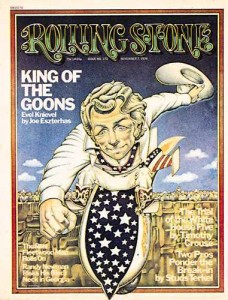Rolling Stone #173: Uriah Heep
Uriah Heep: The Road Takes Its Toll
Los Angeles – “I thought the sum-bitch was dead,” said Warner Bros. promo man Pat Morris, one of the few who allegedly saw Uriah Heep bassist Gary Thain “seriously shocked” during a Dallas concert in mid-September. “He was just playing, then all of a sudden it was like he was having an epileptic fit. The guy was riveted to the neck of his guitar, shaking violently. Then he turned completely white and fell over on his face. I swear he looked like he’d done a deep-six.”
The jolt, which immediately ended a nationwide tour three dates from completion, now appears to be less than a major factor in the cancellation. According to lead singer David Byron, Thain had been seriously ill with borderline hepatitis as well as “completely exhausted” with road fatigue at the time. “If he hadn’t been sick already,” Byron admits, “I guess we would have been able to finish out the tour.”
Some inside sources, including a promoter handling one of the canceled shows, privately maintained there was no shock at all. “Gary had been really abusing himself mentally and physically,” said a friend. “He looked like hell. Emaciated, with thighs as thick as his wrists. And then during the Dallas concert, he cracked. He flipped out.” Road managers and band members – organist Ken Hensley, drummer Lee Kerslake and guitarist Mick Box fill out the lineup – all have an amorphous, memory of the incident. None has any idea whose fault the potentially fatal electric blast was, nor are there indications that they are taking any trouble to find out. The suspiciously cloudy details tend to substantiate the no-shock story.
Whatever the mishap, everyone agrees that it was a direct result of Uriah Heep’s incessant touring schedule. “We’ve been on the road since our first album,” Henley says, sighing. “The press has never really accepted us, so we figured the only way to get anywhere was to keep playing. It’s that way with most English rock & roll bands trying to break through to an American audience. Our music isn’t so special that people would immediately prefer it over everything else. So basically we were five nice little English boys touring around the country saying ‘yes please’ and ‘thank you’ 13 months a year. And now look what we’ve done. Gary’s fallen over. Terrific.”
Byron, on the other hand, can’t think of anything he’d rather do more than tour. “I love being on the road. It’s my whole life, really. Sickness, fatigue… it’s just a hazard of the business. Every job has its hazards. We tour six or eight months a year and the rest of the time is spent recording. We have to release a record every six months. In the end, we usually take four weeks off every year. We’ve got to keep touring, it’s the only way to pay the bills. Especially now that taxes in England are incredible. We may just pack up and move over here.”
In the four years since their first album, Very ‘Eavy, Very ‘Umble, Uriah Heep’s hard work has paid off. Their tours invariably sell out every city’s biggest hall and although their albums have penetrated the Top Ten only once with Uriah Heep Live, the last five of the band’s eight LPs have been gold.
Hensley, for one, would like to forget about maintaining the bands’ commerciality and start upgrading their artistic stature. “I could care less about the money,” he says. “Unfortunately, that’s not the prevalent attitude. The emphasis has gone off music and onto big business. I can’t relate to that situation, so I’m hoping for what has to be a major change in the next year. There’s gonna have to be a lot of alterations around this group. If people aren’t interested in the music, I’m not interested in them as people. I’m a musician and the only thing I seem to be seeing around here are dollar signs. It’s wrong for musicians to keep playing with a specific directive of hanging out for a few more years and collecting the bucks so they can buy farms and property. Music is a much larger commitment than that.”
Uriah Heep has tampered little with their proven formula. Each album contains the same basic recipe of Byron’s brawny, overstated delivery over needlessly pretentious instrumentation. They may very well be a Deep Purple for thinking 12-year-olds but as one critic has suggested, their music runs the entire gamut from A to B. “No one every takes us seriously,” says Hensley, the only member with an apparently crystallized image of the band’s critical status. “Our management quit showing us reviews a long, long time ago.”
If it looks like Hensley, who is currently finishing up his second solo album, is lacing up his walking shoes…well, we’ll soon see. “After my first album [Proud Words on a Dusty Shelf], there were two or three prominent people in the business who told me I’d be better off on my own. I just said, ‘Rubbish, I’m not going to run away.’ But fuck, it’s such an uphill battle.
“This tour as a whole has been disappointing, in some cases nauseating. Uriah Heep is not the type of band that will ever get to the heights of superstardom like the Stones.”
Courtesy of Rolling Stone #173 – Cameron Crowe – November 7, 1974


